人教版九年级英语下册第13单元知识点梳理
人教版九年级英语unit13知识点归纳
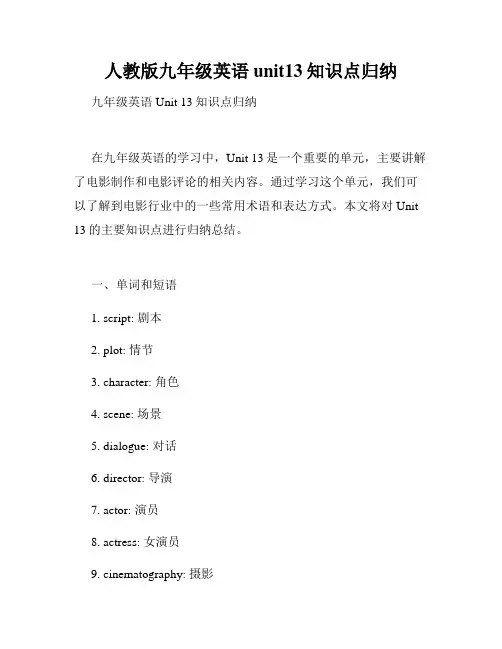
人教版九年级英语unit13知识点归纳九年级英语Unit 13知识点归纳在九年级英语的学习中,Unit 13是一个重要的单元,主要讲解了电影制作和电影评论的相关内容。
通过学习这个单元,我们可以了解到电影行业中的一些常用术语和表达方式。
本文将对Unit 13的主要知识点进行归纳总结。
一、单词和短语1. script: 剧本2. plot: 情节3. character: 角色4. scene: 场景5. dialogue: 对话6. director: 导演7. actor: 演员8. actress: 女演员9. cinematography: 摄影10. special effects: 特效11. soundtrack: 配乐12. box office: 票房13. premiere: 首映式14. sequel: 续集15. genre: 类型二、句型和语法1. 形容词比较级和最高级:例如"The film is more interesting than I expected."和"This is the best movie I've ever seen."2. 定语从句:例如"The actor who played the main character did a great job."3. 被动语态:例如"The film was directed by a famous filmmaker."4. 特殊疑问句:例如"What do you think of the actress in the movie?"5. 宾语从句:例如"He asked me what I thought of the film."三、听力技巧1. 听清语音:要注意区分不同的发音,特别是元音和辅音的区别。
人教版九年级英语Unit13单词、课文,知识梳理,词汇句式精讲
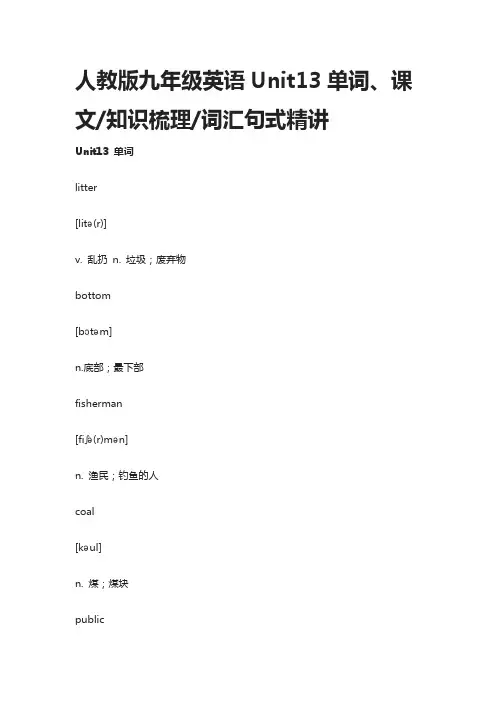
人教版九年级英语Unit13单词、课文/知识梳理/词汇句式精讲Unit13 单词litter[litə(r)]v. 乱扔n. 垃圾;废弃物bottom[bɔtəm]n.底部;最下部fisherman[fiʃə(r)mən]n. 渔民;钓鱼的人coal[kəul]n. 煤;煤块public[p ʌblik]adj. 公众的;公共的n. 民众;百姓ugly[ ʌgli]adj. 丑陋的;难看的advantage[ ədva:ntidʒ]n. 优点;有利条件cost[kɔst; kɔ:st]v. 花费n. 花费;价钱wooden[wudn]adj. 木制的;木头的plastic[plæstik]adj. 塑料的n. 塑料;塑胶make a difference有关系,作用,影响shark[ ʃa:(r)k]n. 鲨鱼fin[fin]n.(.鱼)鳍cut off割掉;砍掉method[meθəd]n. 方法;措施cruel[kru:əl]adj. 残酷的;残忍的harmful[ha:(r)mfl]adj. 有害的chain[tʃein]n. 链子;链条ecosystem[i:kəusistəm]n.生态系统low[ləu[ a(.数量等)减少的;低的;矮的industry[indəstri]n. 工业;行业law[lɔ:]n. 法律;法规reusable[ri:ju:zəbl]adj.可重复使用的;可再次使用的afford[əfɔ:(r)d]v. 承担得起(后果);买得起transportation[t ænspɔ:(r)teiʃn]n. 运输业;交通运输recycle[ri:saikl]v. 回收利用;再利用napkin[næpkin]n. 餐巾;餐巾纸upside down颠倒;倒转gate[geIt]n. 大门bottle[bɔtl]n. 瓶;瓶子president[prezidənt]n. 负责人;主席;总统inspiration[inspəreiʃn]n. 灵感;鼓舞人心的人(或事物)metal[metl]n. 金属creativity[kri:eitivəti]n. 创造力;独创性WildAid[waildeid]野生救援协会(美国)WWF(World Wide Fund For Nature) 世界自然基金会Mark[ma:(r)k]马克(男名)Jason[dʒeisən]贾森(男名)Ken [ken]肯(男名)Hayes [heiz]海斯(姓)Jessica[dʒesikə]杰茜卡(女名)Unit13 知识梳理【重点短语】1. at the bottom of the river 在河床底部2. be full of the rubbish 充满了垃圾3. throw litter into the river 把垃圾扔入河中4. play a part in cleaning it up 尽一份力把它清理干净5. land pollution 土地污染6. fill the air with black smoke 使空气中充满了黑烟7. cut down air pollution 减少空气污染8. make a difference 产生影响17. take action 采取行动18. turn off 关掉19. pay for 付费20. add up 累加21. use public transportation 使用公共交通22. recycle books and paper 回收书和废纸23. use paper napkins 使用纸巾24. turn off the shower 关掉喷头25. ride in cars 开车出行【重点句型】1.Even the bottom of the river was full of rubbish.即使河底都充满垃圾。
完整版人教版九年级英语第十三单元知识点总结
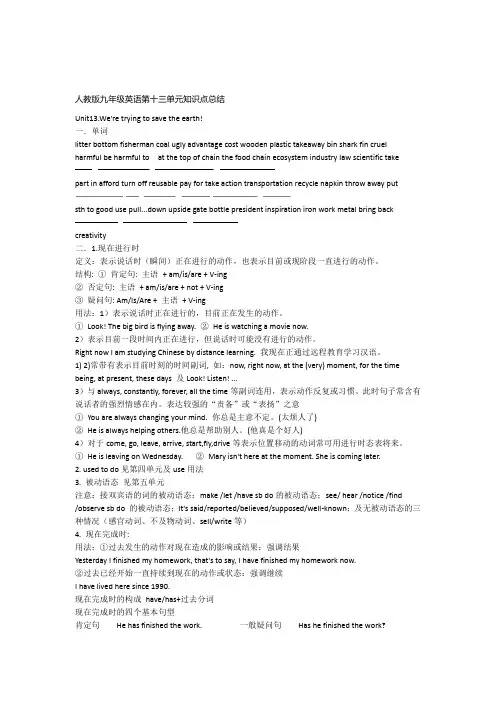
人教版九年级英语第十三单元知识点总结Unit13.We're trying to save the earth!一.单词litter bottom fisherman coal ugly advantage cost wooden plastic takeaway bin shark fin cruel harmful be harmful to at the top of chain the food chain ecosystem industry law scientific takepart in afford turn off reusable pay for take action transportation recycle napkin throw away putsth to good use pull...down upside gate bottle president inspiration iron work metal bring backcreativity二.1.现在进行时定义:表示说话时(瞬间)正在进行的动作,也表示目前或现阶段一直进行的动作。
结构: ①肯定句: 主语+ am/is/are + V-ing②否定句: 主语+ am/is/are + not + V-ing③疑问句: Am/Is/Are + 主语+ V-ing用法:1)表示说话时正在进行的,目前正在发生的动作。
①Look! The big bird is flying away. ②He is watching a movie now.2)表示目前一段时间内正在进行,但说话时可能没有进行的动作。
Right now I am studying Chinese by distance learning. 我现在正通过远程教育学习汉语。
1) 2)常带有表示目前时刻的时间副词, 如:now, right now, at the (very) moment, for the time being, at present, these days 及Look! Listen! ...3)与always, constantly, forever, all the time等副词连用,表示动作反复或习惯。
人教版九年级英语Unit13单元知识点梳理
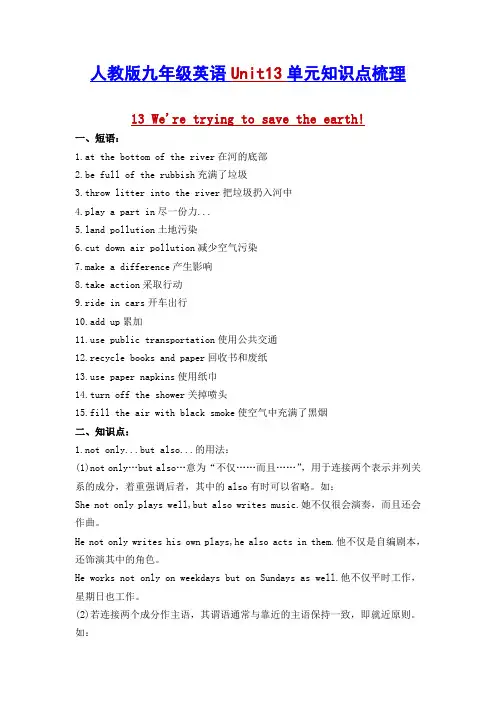
一、短语:1.at the bottom of the river在河的底部2.be full of the rubbish充满了垃圾3.throw litter into the river把垃圾扔入河中4.play a part in尽一份力...nd pollution土地污染6.cut down air pollution减少空气污染7.make a difference产生影响8.take action采取行动9.ride in cars开车出行10.add up累加e public transportation使用公共交通12.recycle books and paper回收书和废纸e paper napkins使用纸巾14.turn off the shower关掉喷头15.fill the air with black smoke使空气中充满了黑烟二、知识点:1.not only...but also...的用法:(1)not only…but also…意为“不仅……而且……”,用于连接两个表示并列关系的成分,着重强调后者,其中的also有时可以省略。
如:She not only plays well,but also writes music.她不仅很会演奏,而且还会作曲。
He not only writes his own plays,he also acts in them.他不仅是自编剧本,还饰演其中的角色。
He works not only on weekdays but on Sundays as well.他不仅平时工作,星期日也工作。
(2)若连接两个成分作主语,其谓语通常与靠近的主语保持一致,即就近原则。
如:Not only you but also he has to leave.不只是你,他也得离开。
(3)若连接两个句子,not only后面的句子要用倒装,如:Not only did he speak more correctly,but he spoke more easily.他不仅说得更正确,而且讲得更不费劲了。
九年级英语下册Unit13单元知识点
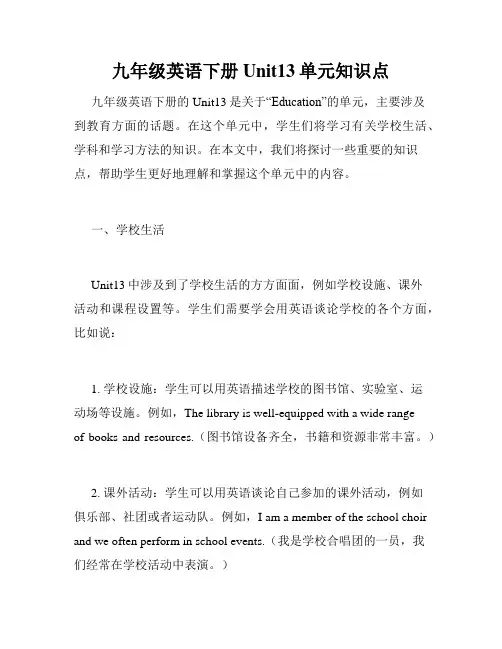
九年级英语下册Unit13单元知识点九年级英语下册的Unit13是关于“Education”的单元,主要涉及到教育方面的话题。
在这个单元中,学生们将学习有关学校生活、学科和学习方法的知识。
在本文中,我们将探讨一些重要的知识点,帮助学生更好地理解和掌握这个单元中的内容。
一、学校生活Unit13中涉及到了学校生活的方方面面,例如学校设施、课外活动和课程设置等。
学生们需要学会用英语谈论学校的各个方面,比如说:1. 学校设施:学生可以用英语描述学校的图书馆、实验室、运动场等设施。
例如,The library is well-equipped with a wide rangeof books and resources.(图书馆设备齐全,书籍和资源非常丰富。
)2. 课外活动:学生可以用英语谈论自己参加的课外活动,例如俱乐部、社团或者运动队。
例如,I am a member of the school choir and we often perform in school events.(我是学校合唱团的一员,我们经常在学校活动中表演。
)3. 课程设置:学生可以用英语介绍自己的课程设置,包括学习科目和上课时间等。
例如,In our school, we have English, math, science, history, and PE. Classes start at 8:30 in the morning and end at 4:00 in the afternoon.(我们学校有英语、数学、科学、历史和体育等科目。
上午8:30开始上课,下午4:00结束。
)二、学科与学习方法除了学校生活,Unit13也涵盖了学科和学习方法的知识。
学生们需要掌握如何用英语讨论各个学科的特点和学习方法。
1. 语言学科:语言学科在学习英语的过程中起着重要的作用。
学生们可以用英语阐述学习英语的好处以及一些学习英语的技巧。
九年级下册13单元知识点
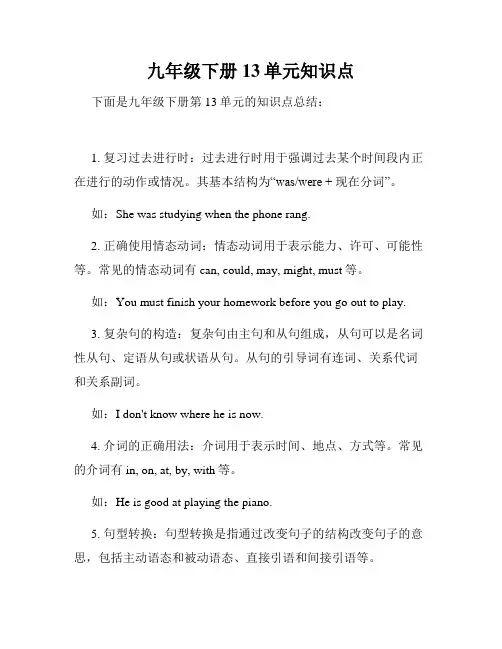
九年级下册13单元知识点下面是九年级下册第13单元的知识点总结:1. 复习过去进行时:过去进行时用于强调过去某个时间段内正在进行的动作或情况。
其基本结构为“was/were + 现在分词”。
如:She was studying when the phone rang.2. 正确使用情态动词:情态动词用于表示能力、许可、可能性等。
常见的情态动词有can, could, may, might, must等。
如:You must finish your homework before you go out to play.3. 复杂句的构造:复杂句由主句和从句组成,从句可以是名词性从句、定语从句或状语从句。
从句的引导词有连词、关系代词和关系副词。
如:I don't know where he is now.4. 介词的正确用法:介词用于表示时间、地点、方式等。
常见的介词有in, on, at, by, with等。
如:He is good at playing the piano.5. 句型转换:句型转换是指通过改变句子的结构改变句子的意思,包括主动语态和被动语态、直接引语和间接引语等。
如:He said, "I am going to the park." → He said that he was going to the park.6. 惯用语的应用:惯用语是一种固定搭配,具有特殊的意义。
学生应掌握一些常见的惯用语,如“it's raining cats and dogs”表示下大雨。
如:He is always making a mountain out of a molehill.7. 句子的修辞手法:修辞手法用于增强语言的表达效果,包括比喻、夸张、反问、排比等。
如:Her smile is as bright as the sun.8. 谚语和成语的理解与应用:学生应对一些常见的谚语和成语进行了解和应用,以丰富自己的语言表达能力。
人教版九年级下册英语Unit 13 单元语法知识梳理
一、现在进行时漂市一中钱少锋现在进行时表示现在或现阶段正在发生或进行的动作。
常见的标志词有now, at the moment(此刻),look, listen等。
其构成为“am / is/ are+动词-ing形式”。
例句:Don't make loud noise. The children are having an English lesson. 不要弄出这么大响声,孩子们正在上英语课。
Listen! She is singing an English song. 听!她正在唱英文歌。
一些表示位置移动的动词,如go, come, leave, arrive等,常用现在进行时表示将来。
例句:He is leaving for Shanghai tomorrow. 明天他将前往上海。
下列动词通常不用于现在进行时:1.表示感觉、情感、心理活动的动词,如see, hear, smell, taste, notice, seem, hate, like, love, want, wish等。
2.表示所有或占有关系的动词,如have, own, belong等。
3.表示记忆、理解、相信、知道或决定的动词,如forget, remember, understand, believe, know, decide等。
二、现在完成时现在完成时表示过去发生的动作对现在产生的影响或结果。
其结构为“have / has +过去分词”。
用法示例表示到现在为止已经发生的动作或状态,句中常用already, just或yet。
They have already cleaned the classroom. 他们已经打扫了教室。
表示到现在为止曾经或从来没有发生过的动作或状态,句中常用ever或never。
I have ever been to that country. 我曾去过那个国家。
表示到目前为止某一动作已经发生了若干次,句中常用once, twice, …times等。
九年级下册unit13知识点
九年级下册unit13知识点九年级下册 Unit 13 知识点Unit 13 是九年级英语教材的一部分,主要讲授有关“照顾动物生活”的知识点。
本单元的目标是让学生了解和掌握如何保护和照顾动物的重要性。
以下是本单元的知识点的详细介绍:一、重点词汇1. protect (v.) - 保护2. wildlife (n.) - 野生动植物3. habitat (n.) - 栖息地4. endangered (adj.) - 濒临灭绝的5. threat (n.) - 威胁6. extinction (n.) - 灭绝7. captivity (n.) - 囚禁,圈养8. conservation (n.) - 保护,保持9. release (v.) - 释放10. responsibility (n.) - 责任二、重点句型1. We should protect wildlife and their habitats.我们应该保护野生动物及其栖息地。
2. Many species are endangered and face the threat of extinction.许多物种处于濒危状态,并面临着灭绝的威胁。
3. Zoos aim to protect animals by keeping them in captivity.动物园通过圈养动物来保护它们。
4. It is our responsibility to conserve the environment and the animals that live in it.保护环境和其生物是我们的责任。
三、知识要点1. 野生动植物保护的重要性野生动植物是我们生态系统的重要组成部分。
保护野生动植物是保护生态平衡、维护生物多样性以及保持地球生态系统稳定的关键。
我们应该尽最大努力保护野生动植物及其栖息地,避免它们灭绝。
2. 濒危物种和灭绝的威胁许多动物种类正处于濒临灭绝的边缘,主要原因是栖息地的破坏、过度捕猎和污染等人类活动带来的威胁。
Unit13知识点 人教版英语九年级全册
九年级U n i t13知识点梳理及拓展一、词汇回顾1.乱扔,垃圾,废弃物____________2.底部,最下部_________________3.公众的,公共的______________4.民众,百姓__________________5.优点,有利条件______________6.花费,花费,价钱_____________7.木制的,木头的_____________ 8.塑料的,塑料,塑胶__________9.有关系,作用,影响___________ 10.方法,措施__________________ 11.残酷的,残忍的______________12.有害的_____________________ 13.链子,链条__________________ 14.工业,行业___________________ 15.可重复使用的______________ 16.承担得起(后果)买得起________ 17.回收利用,再利用_____________ 18.大门__________________________ 19.负责人,主席________________ 20.金属__________________________二、词汇变形1.wood(n.木头)→____________________(adj.木制的)2.harm ( n.伤害) →_________________ (adj.有害的) →_________________adj.无害的3.danger(n.危险) →endanger(v.使遭危险;危及) →___________________ (adj.濒危的) →___________________ (adj, 危险的)w(从法律)--lawyer(n.律师)5._____________(n.科学) →___________________ (adj.科学上的,科学的)→___________________ (n.科学家)e(v.使用) →______________ (v.再次使用) →_____________(adj可再次使用的)7.advantage( n.优点;有利条件) →___________________ (反义词) (n.缺点:不利条件)8.__________(v.运输) →__________________(n.运输业:交通运输)9.inspire(n.鼓舞;激励) →___________________ n.灵感;鼓舞人心的人(或事物)10.c reate(v.创造) →_________________ (adj.有创造力的) →________________ (n.创造力:独创性)→___________________ (n.创者)→___________________ (n.创造;作品)三、短语归纳1._________________/________________充满2.______________________把...扔入...里3.________________________过去常常4.________________________在...中发挥作用5.__________________砍倒6._______________________代替,而不是7._________________________有影响,起作用8.__________________导致,通向9._____________________听说10.______________________对...有害11.___________________________不但...而且12.______________到目前为止13._______________________在...顶端或顶部14.____________________________承担得起做15.________________________参加16.______________付费17._______________关掉18.__________________采取行动19._________________扔掉20.________________恢复,归还,使想起21.__________________清理,打扫干净22._______________________在...中发挥作用23._____________________在...底部24._______________________充分利用25.__________________伤害26.________________________...的数量27._________________________违法28.________________________遵守法律30._______________________交通法规31._________________发生32._______________当心,小心33.________________采取措施34.________________占据,开始从事35.________________________想出36._________________赠送,捐赠37.________________成立;建立;建起38.____________________试穿39.____________试验,尝试,参加…选拔四、知识详解1.try to do =try one’s best to do 尽力做某事-e.g. _____________________________________我们将努力在一周内完成这项工作。
九年级下册UNIT 13知识点
九年级下册UNIT 13知识点九年级下册的UNIT 13是关于科技与未来的单元,本单元内容丰富多样,涉及到了科技的发展、人工智能、未来的职业等方面的知识。
下面将逐一进行探讨。
一、科技的发展随着科技的不断进步,我们的生活得到了极大的改变。
从过去的机械时代,到现在的数字时代,科技改变了我们的方式,提高了我们的效率。
我们可以通过手机、电脑和互联网来获取信息,与人交流。
在危急时刻,科技也可以为我们提供帮助,比如通过无人机救援人员执行任务,通过人工智能设备辅助医生诊断疾病等等。
二、人工智能的发展人工智能是近年来科技发展的一个重要领域,它正在改变着我们的生活和工作方式。
人工智能可以模拟人类的智能,通过学习和反馈来不断提高自身的能力。
比如,目前有一些机器人可以完成简单的日常任务,比如打扫房间、煮饭、招待客人等。
而在医疗领域,人工智能也能够辅助医生进行疾病诊断,提高诊断的准确率。
人工智能还可以应用于交通领域,通过智能交通系统实现车辆自动驾驶,减少交通事故。
三、未来的职业随着科技的快速发展,未来的职业也会出现新的变化。
一些传统的工作可能会被机器人或人工智能所取代,比如一些简单重复的劳动工作。
然而,随着科技的发展,也将会出现更多的职业机会,比如人工智能工程师、虚拟现实设计师、无人机操作员等等。
这些职业与未来科技的发展密切相关,需要具备相关的技术和知识。
总结:科技的发展是不可阻挡的潮流,它改变了我们的生活、工作方式,也创造了更多的机遇和挑战。
在未来,人工智能将扮演着越来越重要的角色,我们需要适应科技的发展,不断学习和提高自己的技能。
同时,我们应该保持对科技的审慎态度,避免科技对人类发展造成负面影响。
通过正确的利用科技,我们可以让未来变得更美好。
- 1、下载文档前请自行甄别文档内容的完整性,平台不提供额外的编辑、内容补充、找答案等附加服务。
- 2、"仅部分预览"的文档,不可在线预览部分如存在完整性等问题,可反馈申请退款(可完整预览的文档不适用该条件!)。
- 3、如文档侵犯您的权益,请联系客服反馈,我们会尽快为您处理(人工客服工作时间:9:00-18:30)。
Unit13 知识要点梳理
【重点短语】
1. at the bottom of the river 在河床底部
2. be full of the rubbish 充满了垃圾
3. throw litter into the river 把垃圾扔入河中
4. play a part in cleaning it up 尽一份力把它清理干净
5. land pollution 土地污染
6. fill the air with black smoke 使空气中充满了黑烟
7. cut down air pollution 减少空气污染
8. make a difference 产生影响
17. take action 采取行动
18. turn off 关掉
19. pay for 付费
20. add up 累加
21. use public transportation 使用公共交通
22. recycle books and paper 回收书和废纸
23. use paper napkins 使用纸巾
24. turn off the shower 关掉喷头
25. ride in cars 开车出行
【重点句型】
1. Even the bottom of the river was full of rubbish. 甚至河底都充满垃圾。
2. Everyone in town should play a part in cleaning it up. 城里的每个人都应当尽一份力把它清理干净。
3. The air is badly polluted because there are too many cars on the road these days. 空气被严重污染因为如今路上的汽车太多了。
4. To cut down air pollution, we should take the bus or subway instead of driving. 为了减少空气污染,我们应当乘坐公汽或地铁而不是开车。
5. I used to be able to see stars in the sky. 我过去能在天空中看到星星。
6. The air has become really polluted around here. I’m getting very worried. 这儿的空气真的已经被污染了,我非常担心。
7. No scientific studies have shown that shark fins are good for health. 没有科学研究说明鱼鳍对人们的健康有好处。
【考点详解】
1. pay的基本用法
(1)pay (sb.)money for sth. 付钱(给某人)买……
例:I have to pay them 20 pounds for this room each month. 我每个月要付20英磅的房租。
(2)pay for sth. 付……的钱。
例:I have to pay for the book lost. 我不得不赔丢失的书款。
(3)pay for sb. 替某人付钱。
例:Don't worry! I'll pay for you. 别担心,我会给你付钱的。
(4)pay sb. 付钱给某人。
例:They pay us every month. 他们每月给我们报酬。
(5)pay money back 还钱。
例:May I borrow 12 yuan from you? I'll pay it back next week. 你能借给我12块钱吗?下周还你。
(6)pay off one's money 还清钱。
2. This method is not only cruel, but also harmful to the environment. 这种方法不仅残酷,而且对环境有害。
(1)not only…but also…意为“不仅……而且……”用于连接两个表示并列关系的成分,着重强调后者,其中的also有时可以省略。
如:She not only plays well, but also writes music. 她不仅很会演奏,而且还会作曲。
He not only writes his own plays, he also acts in them. 他不仅是自编剧本,还饰演其中的角色。
He works not only on weekdays but on Sundays as well. 他不仅平时工作,星期日也工作。
(2)若连接两个成分作主语,其谓语通常与靠近的主语保持一致。
如:Not only you but also he has to leave. 不只是你,他也得离开。
(3)若连接两个句子,not only后面的句子要用倒装。
如:Not only did he speak more correctly, but he spoke more easily. 他不仅说得更正确,而且讲得更不费劲了。
【重点语法】
动词不定式做目的状语时的用法
To cut down air pollution, we should take the bus or subway instead of driving. 为了减少空气污染,我们应当乘坐公汽或地铁而不是开车。
本句中To cut down air pollution是动词不定式作目的状语。
1. 不定式和不定式短语作目的状语
不定式和不定式短语作目的状语,主要用来修饰动词,表示某一动作或状态的目的。
为了使目的意义更加清楚或表示强调意义时,还可以在前面加in order to 或so as to。
例如:I've written it down in order not to forget.
He shouted and waved so as to be noticed.
在句子中作谓语动词的状语的不定式或不定式短语,表示的是主语的目的,因此,其逻辑主语通常是句子的主语。
比较:
To draw maps properly, you need a special pen.(正)
To draw maps properly, a special pen is needed.(误)
由in order to 引导的目的状语,既可以置于句尾,也可以置于句首,而由so as to 引导的目的状语,只能置于句尾,而不能置于句首。
比较:
They started early in order to get there in time.(正)
In order to get there in time, they started early.(正)
They started early so as to get there in time.(正)
So as to get there in time, they started early.(误)
2. 不定式的复合结构作目的状语
当不定式或不定式短语有自己的执行者时,要用不定式的复合结构(即在不定式或不定式短语之前加for + 名词或宾格代词)作状语。
例如:
He opened the door for the children to come in.
She fetched several bottles which she placed on the counter for Harry to inspect.
3. 目的状语从句与不定式的转换
英语中的目的状语从句,还可以变为不定式或不定式短语作状语,从而使句子在结构上得以简化。
可分为两种情况:
(1)当目的状语从句中的主语与主句中的主语相同时,可以直接简化为不定式或不定式短语作状语。
例如:
We'll start early in order that/so that we may arrive in time.
We'll start early in order to/so as to arrive in time.
(2)当目的状语从句中的主语与主句中的主语不相同时,要用动词不定式的复合结构作状语。
例如:
I came early in order that you might read my report before the meeting.
I came early (in order)for you to read my report before the meeting.。
